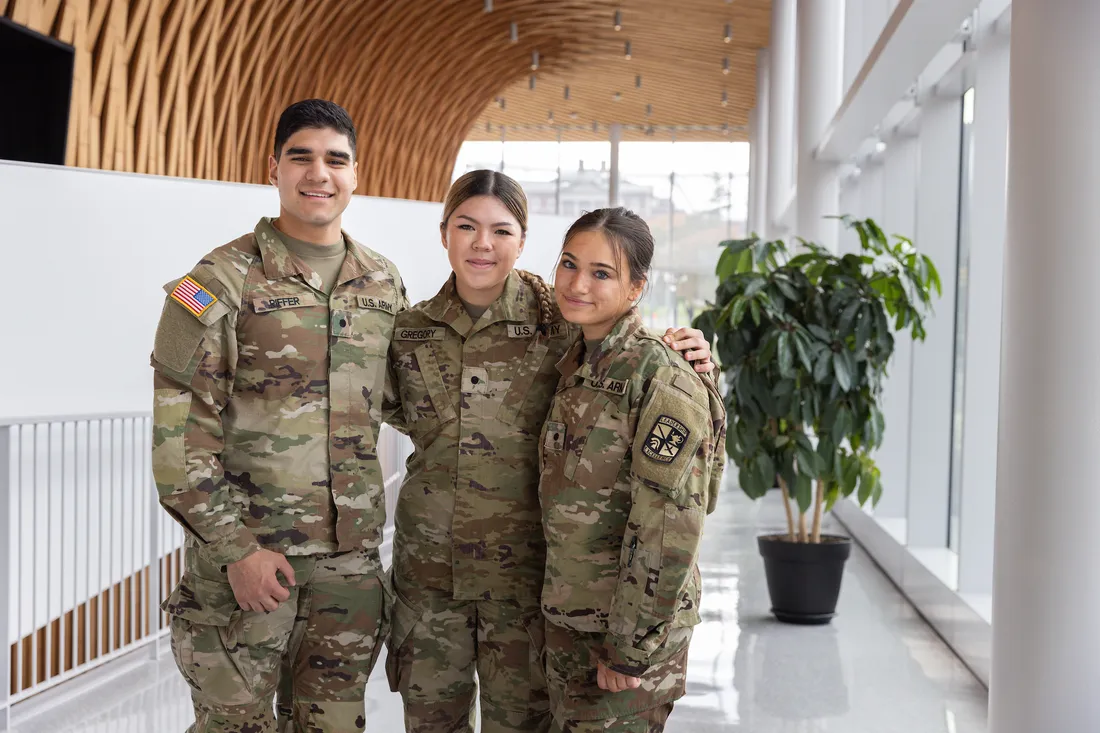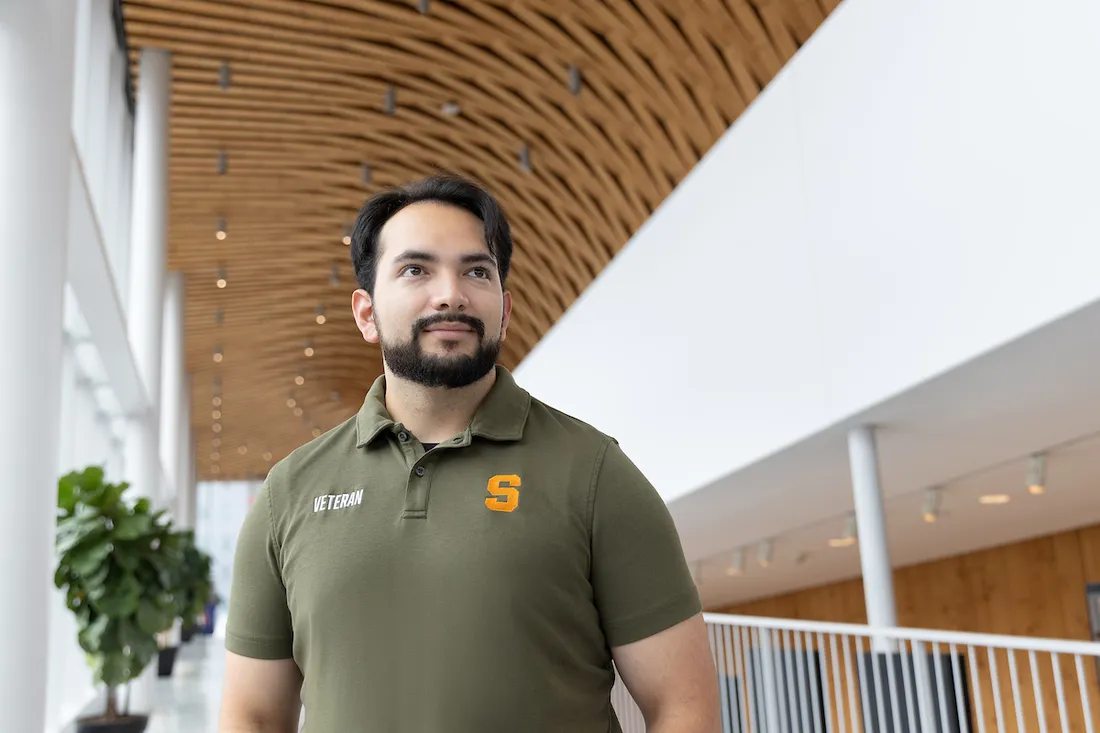
For Nick Armstrong G’08, G’14, the Post-9/11 GI Bill was a “total game changer.” Armstrong now serves as managing director for research and data at the Institute for Veterans and Military Families.
Nick Armstrong’s family has a strong legacy of military service. “Probably going back to the eighth grade I remember wanting to serve my country while pursuing an education at the same time,” says Armstrong, whose grandfather served in Normandy in World War II. “That’s what drew me first to West Point.”
Armstrong graduated in 2000 and commissioned as officer in the U.S. Army. Not long after arriving at his first unit in the 10th Mountain Division at Fort Drum, he was sent to the Balkans for a peacekeeping mission in early September 2001. Armstrong was a second lieutenant out on patrol in Bosnia when the twin towers were attacked on 9/11.
He went on to serve in Afghanistan and then Iraq, and by 2007 he’d transitioned out of the Army. “At that point I was still trying to figure out what I wanted to do post-service,” says Armstrong. He interviewed with an engineering company in Central New York but was still interested in pursuing an advanced degree. “That’s when I found the Maxwell school,” he says.
Armstrong enrolled in the Master of Public Administration program at Syracuse University’s Maxwell School of Citizenship and Public Affairs in 2007 expecting to pursue a path in national security policy in Washington, D.C. “I looked at Syracuse University as a launching pad for my career and was fortunate enough to be picked to be a graduate assistant that first year.” After earning his master’s degree, Armstrong spent a year working for Professor William Banks, who founded and directed the University’s Institute for Security Policy and Law.
His graduate school experience overlapped with passage of the Post-9/11 Veterans Educational Assistance Act of 2008—known as the Post-9/11 GI Bill—which gives educational benefits to veterans who were on active duty in September 2001. “The Post-9/11 GI Bill had just gone into effect, and I’d been talking with Bill Banks and David Van Slyke, another faculty mentor of mine, about the idea of continuing my work for the institute while earning a Ph.D.,” Armstrong recalls. The post-9/11 education benefit was a “total game changer.”
Armstrong became the first student to apply for and receive Post-9/11 GI Bill benefits at Syracuse University, joining 82,000 service members nationwide who applied in the first two months the bill was enacted. The opportunity would give him the flexibility to both work and earn his doctorate. “I would not have pursued my Ph.D. without it.”
Today, Armstrong is the managing director for research and data at Syracuse University’s Institute for Veterans and Military Families (IVMF), a trusted national resource serving veterans and their families. “Pursuing a more research focused career and now being at the IVMF absolutely would not have been possible without it,” he says.
GI Bills Past and Present

Syracuse University’s National Veterans Resource Center serves as the center of veteran life on campus and across the region, housing the Office of Veteran and Military Affairs, the Institute for Veterans and Military Families, Office of Veteran Success, Veteran Career Services, and Army and Air Force ROTC.
The original GI Bill—the Servicemen’s Readjustment Act of 1944—was authored in part by Syracuse University’s seventh Chancellor, William Pearson Tolley. The bill is arguably the most important development at Syracuse University in the second half of its history. By 1947 half of the student body were veterans. It not only drew Syracuse University into national prominence but transformed all of higher education.
The 1944 GI Bill paid full tuition, expenses and books, and a monthly living stipend of $65 for single and $90 for married veterans. By the time that bill expired in 1956, more than 2.2 million veterans had used the benefit for a college education, which led to a better standard of living for recipients and helped fuel the nation’s economic growth in the decades that followed WWII.
After the 9/11 attacks and subsequent wars in both Iraq and Afghanistan, the Post-9/11 GI Bill originated with the concept that those who have served since 9/11 should have the same educational opportunities as those who served during WWII. Proposed by U.S. Sen. Jim Webb of Virginia, the Post-9/11 Veterans Educational Assistance Act was a return to full tuition payments and stipends. Unlike other iterations of the GI Bill that were instituted in the 1970s (known as the Montgomery GI Bill), there is no cost for participating. The benefit is capped at the rate of the most expensive public undergraduate tuition in the state, unless the school enters into the Yellow Ribbon Program—an agreement with the U.S. Department of Veterans Affairs to cover unpaid portions of tuition.
Syracuse University has been a Yellow Ribbon Program school since the program’s inception and has unlimited student participation. Any service member who is eligible for 100% of the GI Bill benefit may attend Syracuse University without out-of-pocket costs and be supported by a dedicated team at the Office of Veteran and Military Affairs.
A Benefit for the Next Generation

Brynn Taylor ’25 plans to major in forensic science using the post-9/11 education benefit transferred from her father, Scott, who serves as director of transfer and veteran admissions.
Brynn Taylor ’25 is a first-year student at Syracuse this fall using the Post-9/11 GI Bill, which allows service members to transfer their benefit to a spouse or child when they meet specific criteria. Her father, Scott, transferred his educational benefit to her after serving more than two decades in the Army.
Brynn recalls moving five times while Scott was on active duty and says the experience of growing up in a military family helped instill an ability to be flexible. “It was actually kind of fun because I liked getting to live in a bunch of different places. When he told me we were moving, I wouldn’t be upset,” she says. “I was always very sad to leave my friends, but I never really had trouble making new ones.”
Scott deployed for several months while Brynn was in the fifth grade. “It was really hard,” she says. “I missed him a lot and it was hard to stay in contact sometimes.” While he was away, Brynn would watch true crime TV shows with her mother. The experience helped spark an interest in the law that inspired her decision to major in forensic science in the College of Arts and Sciences and her plans to eventually become a lawyer.
Although she considered attending Northeastern, Dartmouth and Cornell, Brynn ultimately chose Syracuse University to be close to home. Scott Taylor is the director of transfer and veteran admissions at Syracuse, helping veterans and military family members like Brynn pursue their educational goals. “I feel super grateful,” says Brynn. “The pride that you get, seeing your family member in uniform and thinking, ‘Wow, they’re serving my country.’ I feel really fortunate that he served and that I’m able to go to a good school.”


